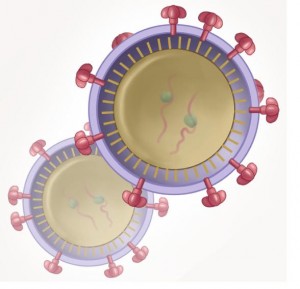THURSDAY, 18 AUGUST 2011
 It is incredibly hard to defend against viruses, because their invasive machinery varies so much and mutates rapidly, evading antivirals. Hence most prophylactic (vaccine) and postphylactic (drug) approaches are specific to viral species.
It is incredibly hard to defend against viruses, because their invasive machinery varies so much and mutates rapidly, evading antivirals. Hence most prophylactic (vaccine) and postphylactic (drug) approaches are specific to viral species.But Dr Todd Rider and his colleagues have developed DRACO, a new drug targeting a near-universal viral characteristic – long double-stranded RNA, which viruses produce when replicating their genetic material inside infected host cells. The team used a host cell enzyme, PKR, which detects this dsRNA and alerts the cell. But since viruses can often evade PKR’s effects, Rider bound the enzyme to APAF-1, a factor that induces cell death. So DRACO detects infected cells and kills them, preventing viral spread. Providing that not too many of an organism’s cells are infected, it eliminates the virus without injuring the host [1].
Of course, as viruses evolve they may evade DRACO, just as they evade PKR. But since DRACO seems effective in vitro against diseases from flu to HIV, this rational approach to universal drug development shows considerable potential.
Written by Bethany Jones
